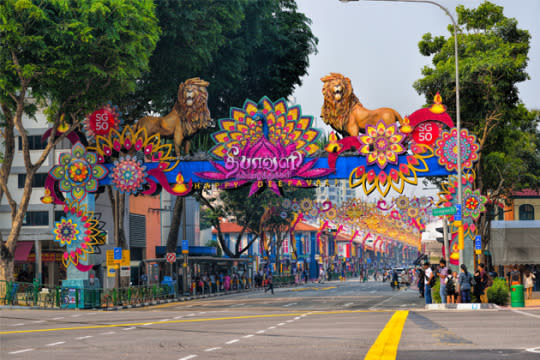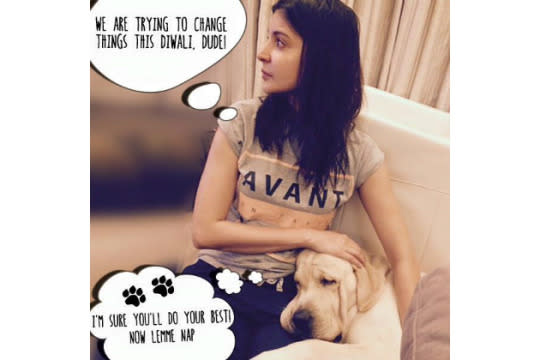Deepavali 2015: What you might not know about the festival of lights
Nope, Deepavali is not the Tamil New Year; read on to find out more about this festive holiday.
By Hong Xinying

Deepavali decorative lights at Little India. Image: Tristan Tan/ Shutterstock
The most common misconception about the festival
Although the festival of lights is celebrated annually here, most Hindus that Yahoo Singapore spoke to felt that some Singaporeans still associate Deepavali festivities with New Year celebrations.
“For people of another culture, a lot of them tend to mistake the first day of Deepavali for the Hindu or Tamil New Year,” said school teacher Indrajit Singh to Yahoo Singapore.
Added the 39-year-old: “But it’s just one of the many festivals that Hindus celebrate. It’s the festival of lights, which celebrates the triumph of good over evil and light over dark.”
Jane Franklin, a Singaporean who works in guest relations, felt the same. She celebrates both Deepavali and Christmas with her family yearly, as her parents have different religious beliefs.
“Some of my friends seem to think that Deepavali is the ‘Indian’ New Year, it’s not, it can’t be when it’s so late in the year,” said the 30-year-old to Yahoo Singapore. “They don’t really know the meaning of Deepavali.”
The actual festival associated with the Hindu New Year tends to fall around mid-April yearly and celebrates the arrival of spring in South India. It is based on the Hindu solar-lunar calendar, which matches the movements of the moon and sun, in relation to the position of the earth.
This first day of the Hindu calendar is known by different names in different parts of India. In Tamil Nadu for instance, it’s known as the Puthandu and in Kerala, it’s known as the Malayalam New Year’s Day.
Differences between Diwali, Deepavali dates and its religious significance
Although the two names for the festival of lights may be used interchangeably in Singapore, there are some notable differences between the two. Some cultural customs vary accordingly as well, depending on the diverse regions of India that these practices originate from.
Deepavali means a “row of lights” in Sanskrit and is also known as Diwali, which is a contraction of ‘Deepavali’.
For complex cultural, social and historical reasons, the Deepavali rituals, its religious significance and methods of celebration may vary depending on the regions of India these traditional practices had originated from.
Celebratory dates can also vary each year, based on the prevailing lunar-solar almanac followed in different parts of the world that celebrate the festival of lights. The time zone can also affect the celebratory dates for Deepavali.
The festival is more commonly referred to as Deepavali in South India where the four-day celebrations kick off on Nov 10 (the ‘no-moon’ day) this year. The first day celebrates Lord Krishna’s triumphant slaying of the demon Narakasura.
In North India, the festival is usually referred to as Diwali and the five-day festival celebrations tend to start a day later (Nov 11 in 2015), which is the lunar day of the new moon where lamps are lit to welcome the return of exiled king Lord Rama of Ayodhya.
The Sikhs on the other hand, commemorate the release of Guru Hargobind (the sixth of the Sikh Gurus) from imprisonment on Diwali, while the Jains celebrate Lord Mahavira’s nirvana; the salvation from the cycle of life and death. To the Jains, the day after Diwali is regarded as New Year’s day for this reason.
Much like festive occasions such as the Lunar New Year (also known colloquially as the Chinese New Year), the festival of lights has also become an increasingly secular occasion for Singaporean families with Indian or Pan-Indian origins, no matter their religious beliefs.
“The importance of Deepavali has always been less about the traditional, customary aspects for some Singaporean families like mine and more about an opportunity for family bonding,” explained graduate student Rajeev Arumugam to Yahoo Singapore.
“It’s now mainly a reason to get together with my family and relatives,” added the 27 year-old.
Why the occasion can be extra special for some newlyweds
Based on prevailing customs in parts of South India, a couple’s first Deepavali together as husband and wife is celebrated as the Thalai Deepavali. This traditional practice originated from Tamil Nadu and is still practiced by some Singaporean families with South Indian ancestry.
According to this tradition, the newlywed couple will typically start their Deepavali day at the bride’s family home and receive gifts of clothing, jewellery and blessings from the elders. The groom’s family and siblings will also join in the festive revelry at the bride’s family home, on the same day.
The dogs get their day too (in Nepal)
Nepal’s annual Tihar festival (also known as Diwali) incorporates elements of the festival of lights during its celebratory five-day period, while getting animals like the dogs in on the fun too.
The second day of Tihar festival is known as the Kukur Tihar (also referred to as Kukur Puja) and celebrates the dogs, in tribute to the canine steed of god Bhairav.
Flower garlands are placed on dogs, which are fed well and bathed first thing in the morning. The tika red dye is also placed on the foreheads of all dogs, be it a stray or a pet, during this celebratory day.
The first, third and fourth days of the Tihar festival in Nepal are also centred around animals; the first day is dedicated to the crow, the third to the cow and the fourth day is centred around the bull.
The downsides to festive fun in India
While firecrackers may be the norm for during this festive period in India, others dread the air and noise pollution that these can cause. Firecrackers have been banned in Singapore since March 1972, according to local newspaper The Straits Times.
Celebrities including Bollywood actress Anushka Sharma recently campaigned for a “Pawsitive” celebration without firecrackers, as setting them off might alarm or hurt animals in the vicinity.
According to The Hindu daily newspaper, the most recent Supreme Court ruling in India denied the request to ban firecrackers completely on Deepavali, as a ban may “affect the traditional and customary rights of the Hindus”.
The Supreme Court however, reiterated the 2005 court order on avoiding the use of firecrackers during “night time” hours from 10pm to 6am on Deepavali.

Image: AnushkaSharma/Twitter
Singapore as a festive travel destination
According to recent Facebook data in India, Singapore is fifth on the list of the world’s top destinations to visit during Deepavali. The likely main reason: familial visits to relatives and friends who live in our city.

